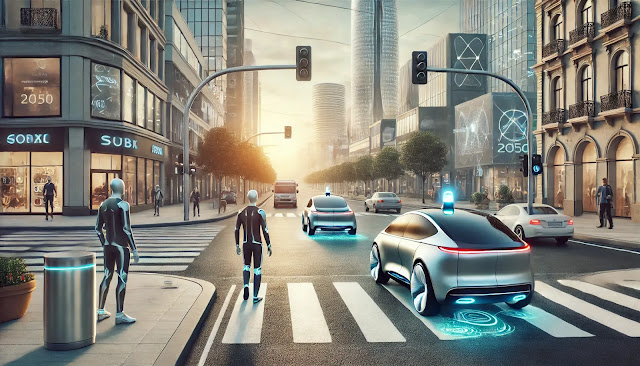In 2050, the city's transportation system was completely redesigned. Cars were no longer just machines. They had become our partners, intelligent agents capable of communicating with one another, the road infrastructure, and even pedestrians.
Every vehicle was equipped with a sophisticated system of sensors and detectors that collected information about the environment. This data was analyzed by artificial intelligence, which not only made decisions but also learned to anticipate human desires. Cars talked to each other, warning about obstacles, accidents, and available parking spaces. Roads, equipped with intelligent sensors, monitored traffic flows, adjusted the operation of traffic lights, and informed drivers about changes in the environment.
But not
everyone in the city immediately embraced these changes. Some admired the
safety and convenience, while others felt alienated in this new world. “The
machines think better than we do,” muttered an old man at the bus stop,
watching perfectly synchronized autonomous vehicles arrive to pick up
passengers. He couldn’t get used to the idea that taxis no longer needed to be
called — the system already knew where he needed to go.
On the
other hand, young people adapted quickly. For them, wristbands that
synchronized with the transport network were an essential part of daily life.
These devices not only shared location data but also planned routes, warned of
dangers, and even recommended nearby cafes or parks.
For me,
this city became a revelation. One day, rushing to work, I paused at a
crosswalk. A car stopped a few meters away to let me pass, and I heard a calm
voice: “Please, go ahead, sir.” It wasn’t the driver but the car itself. It
hadn’t just recognized me — it addressed me as an equal.
At that moment, I realized that technology had changed not only transportation but also ourselves. People became more tolerant, calm, and even kinder. Streets were no longer filled with chaos, honking horns, and frustrated shouting. Instead, the city spoke to us — softly, friendly, and confidently.
However,
behind this idyll lay challenges. People who lost their jobs to automation were
forced to seek new paths. Some felt isolated, unable to trust technologies that
“knew too much.” Others feared what might happen if the system failed or if
someone learned to manipulate it.
All this
made me reflect on the future. It had undeniably arrived. But despite the
perfection of technology, one thing remained vital: to not lose our humanity in
this perfectly organized yet still fragile world.


Комментариев нет:
Отправить комментарий